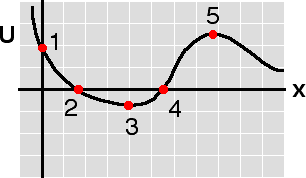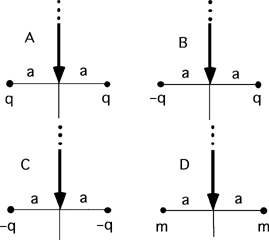Goal: Hone the relationship between E and V
Source: 283-475 Must V=0 if E=0?
True or false: it is possible to have the electric field be 0 at some
point in space and the electric potential be non-zero at that same
point.
- True
- False
Goal: Hone the relationship between E and V
Source: 283-475 Must V=0 if E=0?
True or false: it is possible to have the electric field be 0 at some
point in space and the electric potential be non-zero at that same
point.
Goal: Reason with electrical potential
Source: 283-470 Lowest voltage at origin
Which of the following charge distributions has the lowest electric
potential at the origin?

(5) This question serves to motivate a discussion of the
difference between potential energy in a configuration and the
electrostatic potential at a point. It is also important to stress that
potential when point charges are involved presumes that infinity is the
reference point.
Goal: Link work and potential
Source: 283-465 Interpreting voltage
The potential at two points in space is: V1=200 Volts,
V2=300 Volts. Which of the following statements is true for
moving a point charge, q, from point 1 to 2?
- The work done by an external agent to
move q from point 1 to 2 is positive.- Can’t determine the work
done because you don’t know the direction of V at the two points.- The work done by the electrical force exerted on q in moving it from
point 1 to 2 is: W = -q(100 Volts).
(3) is the best response. Statement A is true only if the charge
is positive. The important thing is to see if students correctly
envision the electric field lines as directed from higher potential to
lower.
Any response involving statement B should be discussed thoroughly as it
indicates confusion between fields and potentials.
Goal: Relate force to potential energy function
Source: UMPERG-ctqpe66

The
potential energy function for a certain body is shown at right. For
which points is Fx = 0?
(4) The force is given by the negative of the slope of the
potential function. Points 3 and 5 are equilibrium points, but only 3 is
a stable equilibrium point. Students frequently choose answer #2
thinking that the force is zero at these points.
Goal: Link work and potential change
Source: 283-450 Move q, do most work

For
the following situations consider moving a positive charge from very far
away to the origin along the y-axis. For which situation would you do
the most work?
(1) Students indicating #7 because they do not know if the masses
are charged should not be disconfirmed. If students key on magnitude
only they will likely choose answer #5.
Commentary:
Answer
(1) Whichever answer students give, ask them to draw a charge
configuration which satisfies their answer. Often this is sufficient to
cause them to change their mind. If appropriate raise for discussion the
case of the interior of a uniformly charged spherical shell.